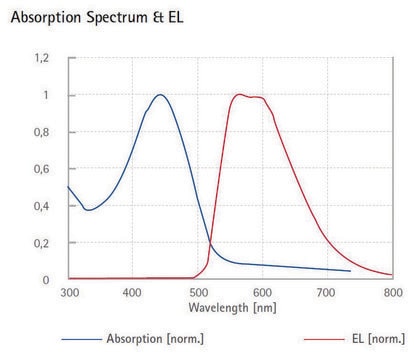541443
Poly[2-methoxy-5-(2-ethylhexyloxy)-1,4-phenylenevinylene]
average Mn 40,000-70,000
Synonyme(s) :
MEH-PPV
About This Item
Produits recommandés
Description
Band gap: 2.3 eV
Niveau de qualité
Poids mol.
average Mn 40,000-70,000
Fluorescence
λex 493 nm; λem 554 nm in toluene
Énergie orbitale
HOMO -5.3 eV
LUMO -3 eV
Performance des dispositifs OLED
ITO/PEDOT:PSS/MEH-PPV/Al
ITO/PEDOT:PSS/MEH-PPV/PBO/Al
ITO/PEDOT:PSS/MEH-PPV/PBZT/Al
Performance des dispositifs OPV
ITO/MEH-PPV/BBL/Al
ITO/MEH-PPV:PC61BM(1:4)/Ca
Mw/Mn
~6
Température de stockage
2-8°C
Catégories apparentées
Description générale
Application
Filter before application.
Code de la classe de stockage
11 - Combustible Solids
Classe de danger pour l'eau (WGK)
WGK 3
Point d'éclair (°F)
Not applicable
Point d'éclair (°C)
Not applicable
Équipement de protection individuelle
Eyeshields, Gloves, type N95 (US)
Certificats d'analyse (COA)
Recherchez un Certificats d'analyse (COA) en saisissant le numéro de lot du produit. Les numéros de lot figurent sur l'étiquette du produit après les mots "Lot" ou "Batch".
Déjà en possession de ce produit ?
Retrouvez la documentation relative aux produits que vous avez récemment achetés dans la Bibliothèque de documents.
Notre équipe de scientifiques dispose d'une expérience dans tous les secteurs de la recherche, notamment en sciences de la vie, science des matériaux, synthèse chimique, chromatographie, analyse et dans de nombreux autres domaines..
Contacter notre Service technique![Poly[2-methoxy-5-(2-ethylhexyloxy)-1,4-phenylenevinylene] average Mn 70,000-100,000](/deepweb/assets/sigmaaldrich/product/structures/344/488/b8f8179d-3970-4deb-a754-adda88cdb36f/640/b8f8179d-3970-4deb-a754-adda88cdb36f.png)
![Poly[(p-phenylenevinylene)-alt-(2-methoxy-5-(2-ethylhexyloxy)-p-phenylenevinylene)]](/deepweb/assets/sigmaaldrich/product/structures/147/963/61b421da-530b-4acf-8851-ecb9492e90ba/640/61b421da-530b-4acf-8851-ecb9492e90ba.png)

![Poly[(9,9-di-n-octylfluorenyl-2,7-diyl)-alt-(benzo[2,1,3]thiadiazol-4,8-diyl)] average Mn ≤25000](/deepweb/assets/sigmaaldrich/product/structures/428/661/1c4ebb98-9d51-48c0-96c7-e556ca425aa4/640/1c4ebb98-9d51-48c0-96c7-e556ca425aa4.png)
![Poly[(m-phenylenevinylene)-co-(2,5-dioctoxy-p-phenylenevinylene)] light-emitting polymer, predominantly trans](/deepweb/assets/sigmaaldrich/product/structures/249/040/9442b889-4fa0-4b4a-b424-cff0769a5ef2/640/9442b889-4fa0-4b4a-b424-cff0769a5ef2.png)




